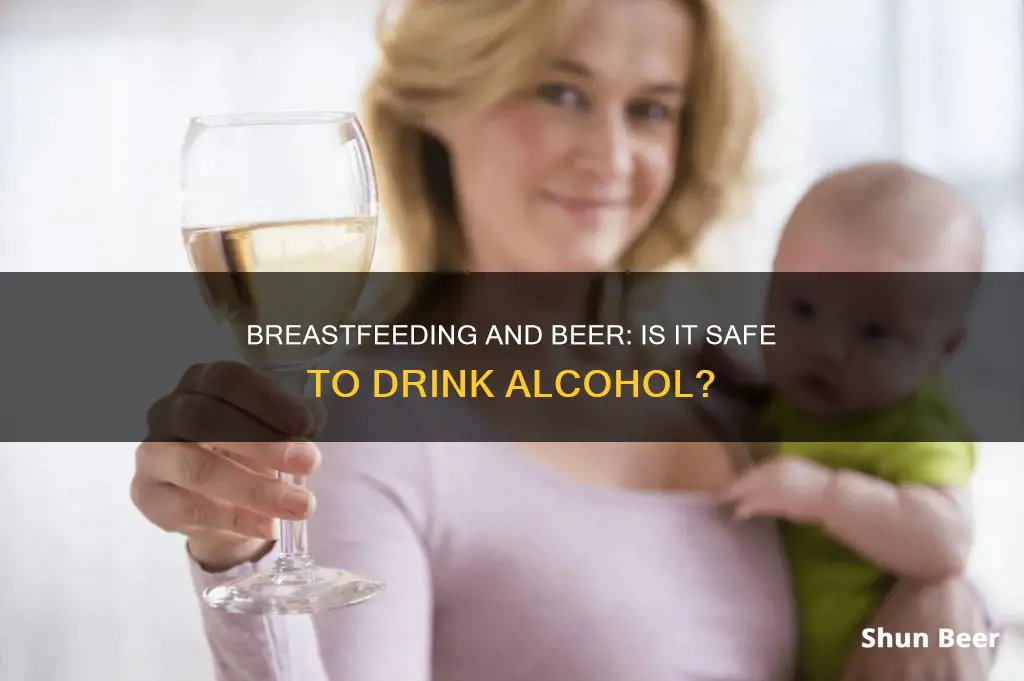
There are many conflicting opinions on whether it is safe for breastfeeding mothers to consume alcohol. While some sources recommend abstaining from alcohol completely, others suggest that occasional drinking is unlikely to harm the baby, especially if the mother waits for at least two hours after drinking before breastfeeding. The general consensus is that moderate alcohol consumption, defined as up to one standard drink per day, is considered safe for breastfeeding mothers. However, it is important to note that alcohol can pass into breast milk and affect the baby's sleep, growth, and development. Therefore, it is recommended to consult with a healthcare professional to make an informed decision about alcohol consumption while breastfeeding.
| Characteristics | Values |
|---|---|
| Occasional drinking | Unlikely to harm the baby, especially if waiting 2 hours before feeding |
| Regular drinking | May be harmful to the mother and baby |
| Binge drinking | May make the mother less aware of the baby's needs |
| Alcohol in breast milk | Alcohol leaves breast milk as it leaves the bloodstream |
| Pumping and dumping | Does not reduce alcohol in breast milk |
| Alcohol and milk supply | Alcohol may decrease milk supply |
| Alcohol and baby development | May cause sleep, growth, and developmental problems |
What You'll Learn
- Occasional drinking is unlikely to harm your baby, especially if you wait at least two hours after drinking before breastfeeding
- Drinking alcohol while breastfeeding can cause sleep, growth and developmental problems for your baby
- Drinking alcohol can decrease your milk supply and affect how much milk your baby drinks
- Alcohol can stay in your breast milk for as long as it's in your bloodstream
- Beer doesn't increase milk supply

Occasional drinking is unlikely to harm your baby, especially if you wait at least two hours after drinking before breastfeeding
According to the Dietary Guidelines for Americans, you can breastfeed about two hours after you've finished one drink. If you've had two drinks, wait four to five hours. The level of alcohol in your milk mimics the amount in your blood. If your blood alcohol content is 0.10%, your breast milk will be the same level. So, as your blood alcohol content drops, your breast milk alcohol content drops, too.
If you're drinking wine, stick to one glass, and be aware that some wines have more alcohol than others. Most table wine is about 12% alcohol, and one standard drink is about five ounces. But wines vary in alcohol content, from about 5% ABV to about 18% ABV – or even as much as 21% for fortified wines.
If you're drinking beer, one alcoholic drink equals 12 ounces of beer (5% alcohol), about the amount found in one bottle. A pint poured at a brewery, however, is more likely to be closer to 15 ounces. Beer varies greatly in alcohol content, too (from about 4% to 7% ABV), so pay attention to the percentage. Beer that contains 9% alcohol will count as two drinks, for example. And don't assume that all light beers are light on alcohol. Many are lower than the typical regular beer, but some contain over 4% alcohol.
By the way, there's no scientific evidence to support the popular wisdom that drinking beer – or any other type of alcohol – boosts your milk supply. For one thing, alcohol dehydrates your body and makes you lose body fluid, which can negatively impact how much milk you make. Also, drinking alcohol disrupts hormones – oxytocin and prolactin – that are involved in milk production.
It's true that a polysaccharide found in barley and malt may increase prolactin levels (which aids milk production). But the alcohol in beer interferes with the oxytocin release necessary for breast milk letdown. So beer isn't a galactagogue (a substance that increases milk supply).
Beer and Pfizer: Safe Drinking After the Vaccine
You may want to see also

Drinking alcohol while breastfeeding can cause sleep, growth and developmental problems for your baby
Drinking alcohol while breastfeeding can cause a range of problems for your baby, including sleep, growth, and developmental issues. While an occasional drink is unlikely to harm your baby, especially if you wait at least two hours after drinking before breastfeeding, regular drinking above the recommended limits can be harmful. Here are some of the specific problems that can arise:
Sleep Disturbances
Alcohol can interfere with your baby's sleep patterns, causing shorter sleep periods, more frequent wakefulness, and less total active and REM sleep. Research by Mennella and Garcia-Gomez found that when an infant was exposed to alcohol in breast milk within 3.5 hours of the mother consuming alcohol, their sleep patterns were disrupted for up to 24 hours.
Decreased Milk Intake
Alcohol can inhibit the milk ejection reflex in mothers, leading to a reduction in the baby's milk intake. Research by Mennella et al. found that infants consumed approximately 20% less breast milk in the three-to-four-hour period after mothers consumed a small to moderate amount of alcohol.
Decreased Weight Gain
Alcohol can negatively impact your baby's weight gain. By interfering with the milk ejection reflex, alcohol can reduce the amount of milk available for your baby, leading to decreased weight gain.
Impaired Immune Function
Exposure to alcohol in breast milk can impair your baby's immune function, making them more susceptible to illnesses.
Delay of Motor Development
Regular exposure to alcohol in breast milk has been linked to delayed motor development in infants. A review by Nonacs showed that the more alcohol infants consumed through breast milk, the lower they scored on indices of motor development.
Potential Impairment of Cognitive Development
Alcohol consumption during lactation may also have negative effects on your baby's cognitive development, including potential impairments in memory and inhibitory responses. Animal research indicates that alcohol may be toxic to the developing brain, especially during the first year after birth.
It is important to note that the long-term effects of alcohol exposure through breast milk are still unknown, and more research is needed to fully understand the potential risks. However, given the potential for negative outcomes, it is recommended to limit alcohol consumption while breastfeeding and to prioritize your baby's health and well-being.
Understanding Beer Flash Coolers: Science Behind the Froth
You may want to see also

Drinking alcohol can decrease your milk supply and affect how much milk your baby drinks
Drinking alcohol can negatively impact your milk supply and your baby's milk intake. Alcohol can pass into your breast milk and then into your baby when you feed them. While an occasional drink is unlikely to harm your baby, drinking too much can decrease your milk supply.
A long-standing belief is that consuming alcohol, particularly beer, while breastfeeding can help boost milk production. However, research shows that this is not the case. Alcohol can decrease oxytocin levels, which are crucial for the milk ejection reflex. The lower the level of oxytocin, the longer the delay in the ejection of milk. This means that your baby will get less milk even though they may seem to be nursing normally.
According to research by Mennella, infants consumed approximately 20% less breast milk in the three-to-four-hour period after their mothers consumed a small to moderate amount of alcohol. Similarly, additional research by Mennella and Beauchamp showed that infants consumed about 23% less milk.
If you do choose to drink alcohol, it is recommended to wait at least 2 hours after having a drink before breastfeeding to avoid exposing your baby to any alcohol in your milk. It's also important to note that the more you drink, the longer it takes for the alcohol to clear your system.
Morning Beer: Should You Drink Before Work?
You may want to see also

Alcohol can stay in your breast milk for as long as it's in your bloodstream
Alcohol can pass into your breast milk and then into your baby when you feed them. The amount of alcohol in breast milk is similar to the amount in the mother's blood and peaks 30 to 60 minutes after consuming an alcoholic beverage. The alcohol can typically be detected in breast milk for about 2 to 3 hours after a single drink, but this duration increases with the amount of alcohol consumed. For instance, alcohol from two drinks can be detected for about 4 to 5 hours, and from three drinks, for about 6 to 8 hours.
The length of time alcohol stays in the breast milk depends on several factors, including the amount of alcohol consumed, how quickly it was consumed, whether it was consumed with food, the mother's body weight, and individual variations in alcohol absorption and metabolism. Generally, smaller mothers need more time to process and eliminate alcohol from their bloodstream.
The only way for alcohol to leave the breast milk is for it to leave the mother's bloodstream. Pumping and dumping will not remove alcohol from the breast milk. Instead, the level of alcohol in the milk will fall as the level of alcohol in the mother's body falls.
Drinking Beer While Pregnant: How Much Is Too Much?
You may want to see also

Beer doesn't increase milk supply
While it is often believed that beer can increase a breastfeeding mother's milk supply, there is no scientific evidence to support this claim. In fact, alcohol has been shown to decrease milk production and impair the milk ejection reflex, resulting in reduced milk intake by the baby.
The belief that beer increases milk supply may stem from the presence of barley in beer, which can stimulate prolactin secretion and enhance lactogenesis. However, this effect is not caused by the alcohol content, and there are no systematic studies to evaluate the clinical effects of beer on milk production. Additionally, short-term studies have shown that moderate alcohol consumption by breastfeeding mothers leads to reduced breast milk intake by infants.
Alcohol consumption during breastfeeding can have several negative effects on both the mother and the baby. Alcohol can cause drowsiness, deep sleep, weakness, and abnormal weight gain in infants. It can also impair the mother's milk ejection reflex, leading to decreased milk supply over time. Regularly drinking above recommended limits can be harmful to both the mother and the baby and may cause sleep, growth, and developmental problems in the infant.
To maintain a sufficient milk supply and avoid potential harm to the baby, it is recommended to limit alcohol consumption and practice responsible drinking habits. Waiting at least 2 hours after consuming alcohol before breastfeeding can help reduce the baby's exposure to alcohol in the milk. It is also important to note that "pumping and dumping" does not eliminate alcohol from the milk faster than the body naturally removes it.
Morning Beer: Should You Drink Before Work?
You may want to see also
Frequently asked questions
Yes, but it's important to drink responsibly and understand the potential risks.
It's recommended to limit alcohol consumption to one drink per day. However, this may vary depending on your body weight, the type of drink, and other factors.
It's generally recommended to wait for at least two hours after drinking a beer before breastfeeding. This allows time for the alcohol to leave your breast milk and your body.
Drinking alcohol while breastfeeding may decrease breast milk production and affect the baby's sleep patterns and weight gain. It can also cause neurological and developmental problems in the baby if consumed regularly.







